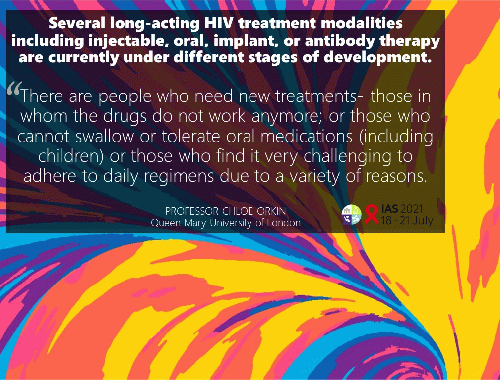It was 40 years ago when the first case of HIV infection was diagnosed. Since then, 77.5 million people have been infected with the virus and 34 million people have died from AIDS-related causes. While a lot has been achieved in terms of providing lifesaving antiretroviral treatment to save lives, we still lost 690,000 people living with HIV to AIDS-related illnesses in 2020. Even today more than 10 million (27%) of the 37.6 million people living with HIV are not on treatment. Moreover, "we are getting signals of HIV drug resistance, which means we need to strengthen our surveillance efforts and continue to invest in long-acting prevention and treatment tools, in the absence of an HIV vaccine, and also remember that solutions we find may not be one size that fits all", said Dr Adeeba Kamarulzaman, President of the International AIDS Society (IAS), during the closing session of the recently concluded 11th International IAS Conference on HIV Science (IAS 2021).
This article, 2nd in the series of an exclusive trilogy by CNS head and IAS HIV Science 2021 Media Fellowship Awardee Shobha Shukla, showcases some recent scientific advances made in the new drug pipeline for HIV treatment, that were discussed during IAS 2021.
Reiterating the need for developing new treatment options for people living with HIV, Professor Chloe Orkin, Clinical Professor at Queen Mary University of London said, "There are people who need new treatments- those in whom the drugs do not work anymore; or those who cannot swallow or tolerate oral medications (including children) or those who find it very challenging to adhere to daily regimens due to a variety of reasons."
Several long-acting HIV treatment modalities including injectable, oral, implant, or antibody therapy are currently under different stages of development.
Long acting cabotegravir/ rilpivirine monthly and 2-monthly injectable
This 2-drug long-acting injectable antiretroviral-based regimen for maintenance of viral load suppression consists of Rilpivirine (a non-nucleoside reverse transcriptase inhibitor) and Cabotegravir (an integrase inhibitor).
It has already been approved and licensed for use in the European Union (EU) and in USA.
Cabotegravir/ Rilpivirine intramuscular injections can be used by those people living with HIV who are on oral antiretroviral therapy. are virally suppressed for at least 3 months, and are not resistant to either of these drugs and do not have active Hepatitis B (as Cabotegravir cannot treat Hepatitis B, while a Tenofovir disoproxil fumarate (TDF) and Tenofovir Alafenamide (TAF) regimen does). Pregnant women are excluded from using this injectable, because as of now there is no clinical data for them.
(Note: You can view every article as one long page if you sign up as an Advocate Member, or higher).






